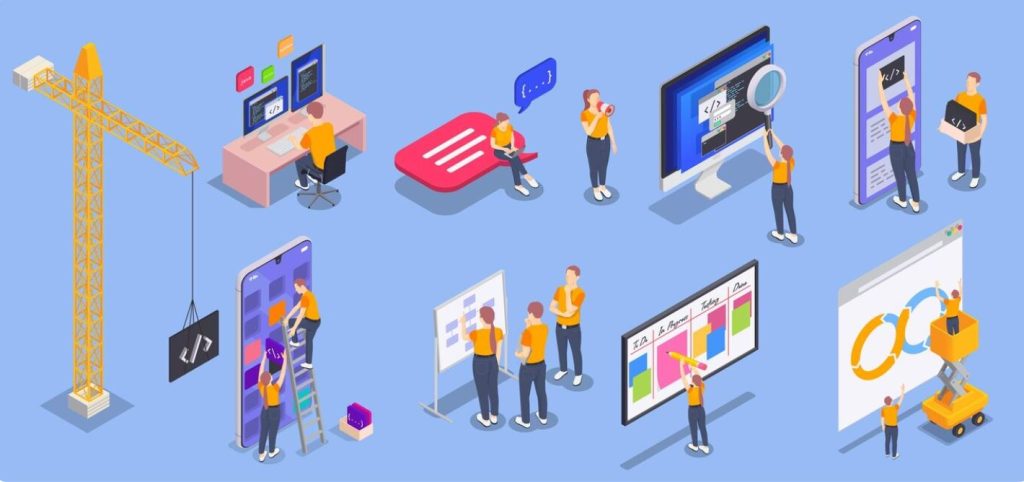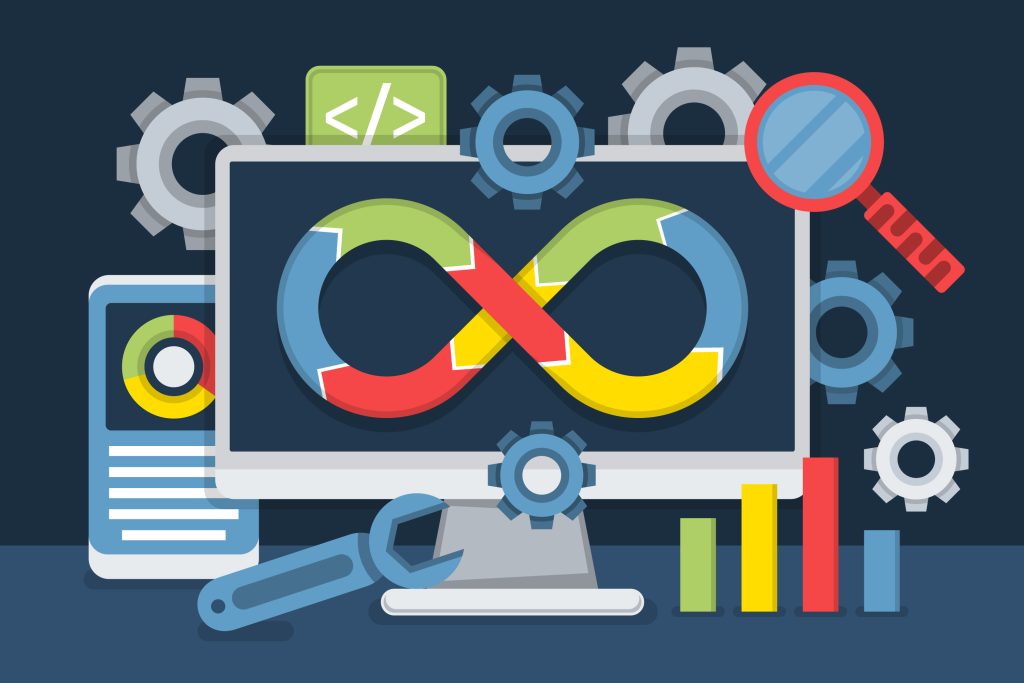DevOps Engineer Roles and Responsibilities

The role of a DevOps engineer has become pivotal in modern software development, bridging the gap between development and operations to deliver high-quality software at speed. As organizations increasingly adopt DevOps practices to streamline workflows and enhance collaboration, the demand for skilled DevOps engineers continues to grow. This article explores the roles and responsibilities of a DevOps engineer, detailing their core functions, tools, and the impact they have on modern software delivery. Whether you’re an aspiring DevOps professional or a business leader looking to understand this role, this guide provides a clear and comprehensive overview.
What is a DevOps Engineer?
A DevOps engineer is a professional responsible for implementing and managing the processes, tools, and methodologies that enable seamless collaboration between software development and IT operations. The term “DevOps” combines “development” and “operations,” reflecting a cultural and technical movement aimed at breaking down silos, automating workflows, and accelerating software delivery.
DevOps engineers act as facilitators, ensuring that software is developed, tested, deployed, and maintained efficiently. They leverage automation tools, cloud platforms, and continuous integration/continuous deployment (CI/CD) pipelines to achieve these goals. Importantly, DevOps engineers are not just technical experts; they are also communicators who foster collaboration across teams.
For example, a DevOps engineer might use tools like Jenkins for CI/CD automation or Terraform for infrastructure as code (IaC) to streamline processes. Their role is dynamic, evolving with the needs of the organization and the rapid advancements in technology.
Why DevOps Engineers Are Essential
In traditional software development, development and operations teams often worked in isolation, leading to delays, miscommunication, and inefficiencies. DevOps engineers address these challenges by promoting a culture of shared responsibility and continuous improvement. Their work ensures faster delivery of software, higher reliability, and improved scalability.
Moreover, DevOps engineers help organizations respond to market demands quickly. For instance, a company using a DevOps tool like monday.com can manage workflows and track progress across development and operations, ensuring alignment and transparency. As a result, DevOps engineers are critical to achieving business agility and maintaining a competitive edge.
Core Responsibilities of a DevOps Engineer

The responsibilities of a DevOps engineer are diverse, spanning technical, collaborative, and strategic tasks. Below, we outline the primary duties that define this role.
1. Building and Maintaining CI/CD Pipelines
One of the cornerstone responsibilities of a DevOps engineer is designing and maintaining CI/CD pipelines. These pipelines automate the process of building, testing, and deploying code, enabling teams to release software updates frequently and reliably.
For example, a DevOps engineer might configure Jenkins or GitLab CI to automatically run unit tests whenever a developer commits code to a repository. If the tests pass, the code is deployed to a staging environment for further validation. This automation reduces manual errors and accelerates delivery cycles.
Additionally, DevOps engineers monitor pipeline performance, optimize workflows, and troubleshoot issues. They ensure that pipelines are secure, scalable, and aligned with organizational goals.
2. Infrastructure Management and Automation
DevOps engineers are responsible for managing infrastructure, often using Infrastructure as Code (IaC) tools like Terraform, Ansible, or AWS CloudFormation. By defining infrastructure in code, they can provision and manage resources consistently across environments.
For instance, a DevOps engineer might use Terraform to deploy a set of cloud resources on AWS, ensuring that development, staging, and production environments are identical. This approach minimizes configuration drift and simplifies scaling.
Furthermore, automation is a key focus. DevOps engineers automate repetitive tasks, such as server provisioning or application deployment, to free up time for higher-value work. Tools like Ansible allow them to automate server configurations, while Kubernetes helps manage containerized applications at scale.
3. Monitoring and Performance Optimization
Monitoring is a critical aspect of a DevOps engineer’s role. They implement tools like Prometheus, Grafana, or Datadog to track the performance and health of applications and infrastructure. By analyzing metrics and logs, they identify bottlenecks, predict failures, and ensure system reliability.
For example, a DevOps engineer might set up alerts in Grafana to notify the team if CPU usage exceeds a certain threshold. They also use log management tools like ELK Stack (Elasticsearch, Logstash, Kibana) to centralize and analyze logs, making it easier to troubleshoot issues.
In addition to monitoring, DevOps engineers optimize performance by fine-tuning infrastructure and applications. This might involve adjusting resource allocation in a cloud environment or optimizing database queries to reduce latency.
4. Ensuring Security and Compliance
Security is a shared responsibility in DevOps, often referred to as “DevSecOps.” DevOps engineers integrate security practices into the software development lifecycle, ensuring that applications and infrastructure are secure from the outset.
For instance, they might use tools like Snyk or Aqua Security to scan code and containers for vulnerabilities. They also enforce compliance with industry standards, such as GDPR or HIPAA, by implementing access controls, encryption, and audit trails.
Moreover, DevOps engineers collaborate with security teams to conduct regular audits and penetration testing. By embedding security into CI/CD pipelines, they ensure that vulnerabilities are caught early, reducing the risk of breaches.
5. Collaboration and Communication
A DevOps engineer serves as a bridge between development, operations, and other stakeholders, such as quality assurance (QA) and product management. They facilitate collaboration by fostering a culture of transparency and shared ownership.
For example, using a platform like monday.com, a DevOps engineer can create dashboards to track project progress, assign tasks, and communicate updates in real time. This ensures that all teams are aligned and informed throughout the development process.
Additionally, DevOps engineers advocate for best practices, such as version control with Git or agile methodologies. They often lead training sessions or workshops to help teams adopt new tools and processes, further strengthening collaboration.
6. Cloud and Container Management
With the rise of cloud computing, DevOps engineers are increasingly responsible for managing cloud-based infrastructure. They work with platforms like AWS, Azure, or Google Cloud to deploy and scale applications efficiently.
For instance, a DevOps engineer might use AWS Elastic Kubernetes Service (EKS) to manage containerized workloads, ensuring high availability and scalability. They also leverage container orchestration tools like Kubernetes or Docker Swarm to automate deployment, scaling, and management of containerized applications.
Furthermore, DevOps engineers optimize cloud costs by monitoring usage and implementing cost-saving measures, such as reserved instances or auto-scaling policies.
Key Tools and Technologies for DevOps Engineers

To execute their responsibilities effectively, DevOps engineers rely on a wide range of tools. Below are some of the most commonly used tools, categorized by their purpose.
1. Version Control and Collaboration
- Git: A distributed version control system for tracking code changes. Platforms like GitHub, GitLab, and Bitbucket provide hosting and collaboration features.
- monday.com: A project management and collaboration tool that helps teams track tasks, workflows, and progress.
2. CI/CD Tools
- Jenkins: An open-source automation server for building CI/CD pipelines.
- GitLab CI/CD: A built-in CI/CD solution for GitLab repositories.
- CircleCI: A cloud-based CI/CD platform for automating build and deployment processes.
3. Infrastructure as Code (IaC)
- Terraform: A tool for defining and provisioning infrastructure as code.
- Ansible: An automation tool for configuration management and application deployment.
- Puppet and Chef: Tools for automating server configuration and management.
4. Containerization and Orchestration
- Docker: A platform for containerizing applications, making them portable and consistent.
- Kubernetes: An orchestration platform for managing containerized workloads at scale.
5. Monitoring and Logging
- Prometheus: An open-source monitoring and alerting toolkit.
- Grafana: A platform for visualizing metrics and creating dashboards.
- ELK Stack: A suite of tools for centralized logging and analysis.
6. Cloud Platforms
- AWS: A comprehensive cloud platform offering services like EC2, S3, and Lambda.
- Azure: Microsoft’s cloud platform with services for computing, storage, and analytics.
- Google Cloud: A suite of cloud services for hosting and scaling applications.
By mastering these tools, DevOps engineers can streamline processes, improve efficiency, and deliver reliable software solutions.
Skills and Qualifications for DevOps Engineers
To succeed as a DevOps engineer, professionals need a blend of technical expertise, soft skills, and a mindset geared toward continuous learning. Below are the key skills and qualifications required.
1. Technical Skills
- Programming and Scripting: Proficiency in languages like Python, Bash, or Go for automation and tooling.
- Cloud Expertise: Experience with cloud platforms like AWS, Azure, or Google Cloud.
- Containerization: Knowledge of Docker and Kubernetes for managing containerized applications.
- CI/CD Mastery: Familiarity with tools like Jenkins, GitLab CI, or CircleCI.
- Networking and Security: Understanding of networking protocols, firewalls, and security best practices.
2. Soft Skills
- Collaboration: Ability to work effectively with cross-functional teams.
- Problem-Solving: Strong analytical skills to troubleshoot issues and optimize systems.
- Communication: Clear communication to explain technical concepts to non-technical stakeholders.
3. Certifications
Certifications can validate a DevOps engineer’s expertise and enhance career prospects. Popular certifications include:
- AWS Certified DevOps Engineer: Demonstrates expertise in AWS cloud services and DevOps practices.
- Certified Kubernetes Administrator (CKA): Validates skills in managing Kubernetes clusters.
- Docker Certified Associate: Certifies proficiency in Docker and containerization.
Challenges Faced by DevOps Engineers
While the role of a DevOps engineer is rewarding, it comes with challenges that require adaptability and resilience. Some common challenges include:
- Tool Overload: The rapid proliferation of DevOps tools can be overwhelming. Engineers must stay updated on new tools while mastering existing ones.
- Cultural Resistance: Some organizations resist adopting DevOps practices due to entrenched silos or reluctance to change.
- Security Concerns: Integrating security into fast-paced development cycles can be challenging, especially in regulated industries.
- On-Call Responsibilities: DevOps engineers often handle production issues, requiring availability outside regular hours.
To overcome these challenges, DevOps engineers must prioritize continuous learning, advocate for cultural change, and leverage automation to reduce manual workloads.
The Future of DevOps Engineering

As technology evolves, so does the role of the DevOps engineer. Emerging trends are shaping the future of this field, including:
- AI and Machine Learning: DevOps engineers are increasingly using AI-driven tools for predictive analytics, anomaly detection, and automated testing.
- Serverless Computing: Platforms like AWS Lambda and Azure Functions are simplifying infrastructure management, allowing DevOps engineers to focus on application logic.
- GitOps: A practice that uses Git as the single source of truth for infrastructure and application deployment, streamlining workflows.
- Zero Trust Security: With rising cyber threats, DevOps engineers are adopting zero-trust architectures to enhance security.
By staying ahead of these trends, DevOps engineers can continue to drive innovation and deliver value to their organizations.
Conclusion
In summary, DevOps engineers play a critical role in modern software development, enabling organizations to deliver high-quality software quickly and reliably. Their responsibilities span CI/CD pipeline management, infrastructure automation, monitoring, security, and collaboration. By leveraging tools like Jenkins, Terraform, Kubernetes, and monday.com, they streamline workflows and foster a culture of shared responsibility.
As the demand for DevOps expertise grows, professionals in this field must stay adaptable, continuously learning new tools and practices. Whether you’re considering a career as a DevOps engineer or seeking to understand their impact, this guide highlights the essential roles, responsibilities, and skills that define this dynamic profession. By embracing automation, collaboration, and innovation, DevOps engineers are shaping the future of software delivery, one pipeline at a time.
You might also be interested Understanding DevOps: Meaning, Practices, and Tools



